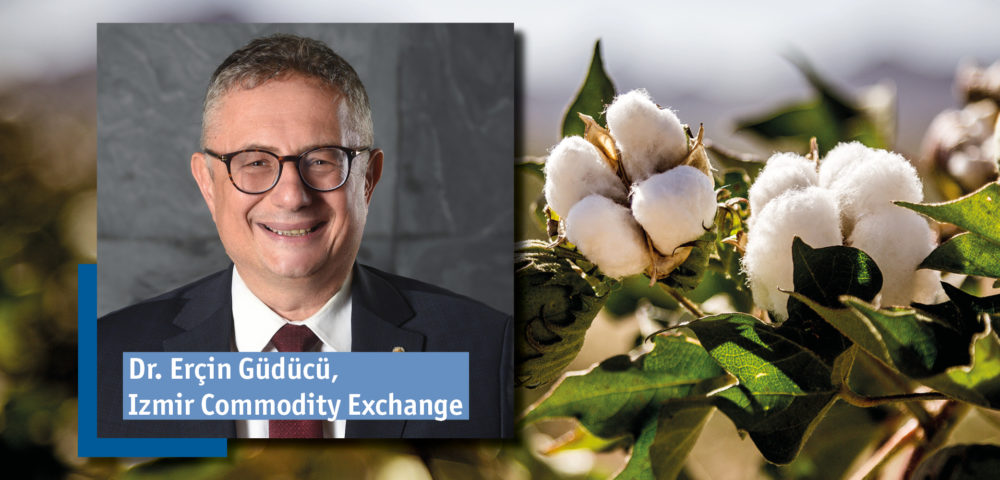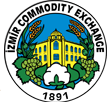 Interview with Secretary General Dr Erçin Güdücü, Izmir Commodity Exchange:
Interview with Secretary General Dr Erçin Güdücü, Izmir Commodity Exchange:
The Izmir Commodity Exchange (ICE) has been shaping cotton trading in Türkiye for more than 130 years. The editors of the Bremen Cotton Report spoke with Secretary General Dr. Erçin Güdücü about the tasks and special features of the ICE, the Turkish cotton trade, and also about the current situation in Türkiye after the severe earthquake that claimed the lives of more than 50,000 people.
Bremen Cotton Report: What are the tasks of the Izmir Commodity Exchange and what role does cotton play?
Dr Erçin Güdücü: Izmir Commodity Exchange is a public member-run professional organization and exchange which was established in 1891 as the first commodity exchange of Türkiye. The main tasks of ICE are establishing markets for agricultural commodities, regulating and registering the purchase and sales of the goods quoted in ICE quotation list, determining and declaring the daily prices of these goods, oversighting the legal arrangements about the responsibilities of the buyers and sellers.
Cotton is one of the most important commodities traded on ICE. In Aegean Region with more than 550 thousand tons of seed cotton and about 220 thousand tons of fiber cotton are produced every year. About 40% of the seed cotton and almost 60% of the cotton produced in the Region are traded or registered in the ICE. In this respect, ICE is the place where the cotton market and reliable transparent prices are formed. For this reason, ICE is also well known as the cotton exchange.
What services do you offer to members and the industry in the cotton sector?
Since we, as an exchange, have an important role in the cotton market, we provide various services to our members and perform projects to improve the product, members and the sector.
Arbitration Services: Arbitration committees are formed by the ICE in order to resolve the disputes arising from the trading of goods that are included in the quotation list.
Information Services: The prices formed through registration of trades in ICE are disseminated regularly via the website of ICE under the name of “registration bulletins”. Also, the market and closing prices determined in cotton trading halls are announced live every day. Additionally, ICE builds databases related to the overall economy and the agricultural sector.
Laboratory and Classification Services: Izmir Commodity Exchange Laboratory, R&D and Consultancy Services Inc. (IZLADAS) was established by ICE in 2013. IZLADAS provides analysis support to licensed cotton warehouses and all cotton stakeholders. We are very proud that IZLADAS has been performing top level in the global round-tests of the Bremen Cotton Exchange for many years.
Licensed Warehousing and Electronic Receipts: Aegean Agricultural Products Licensed Warehousing Inc. (ELIDAS) is the first company among the licensed warehouses, which has adopted the licensed warehousing system for cotton and initiated the electronic warehouse receipt for the goods deposited.
Harvest Estimation Studies: ICE carries out harvest estimation studies for cotton using satellite images and ground samples since the season 2000/01 with at most 3% error rate.
Registration of Geographical Indications: ICE has the geographical indications for cotton called “Aegean Cotton” which is of great reputation for Izmir and Aegean Region.
“GMO-free Turkish Cotton” Labelling Project: Only non-GMO seeds are allowed for cotton production in Türkiye. Therefore, Turkish cotton brings about an important marketing opportunity for both cotton markets and textile-apparel industries. ICE has conducted the project which will allow all textile and apparel products, starting from cotton bales to be labelled as “GMO-free” in cooperation with the National Cotton Council of Türkiye and Istanbul Textile and Apparel Exporters Associations.
Can you give us an assessment of the situation in the Turkish cotton and textile industry after the severe earthquake?
The provinces most affected by the devastating earthquake are Kahramanmaraş, Gaziantep, Malatya, Diyarbakır, Kilis, Şanlıurfa, Adıyaman, Hatay, Osmaniye, Elazığ and Adana. The affected population is over 14 million living on approximately 110 thousand square kilometers. The affected region is a very important agricultural district. Approximately 73% of Türkiye’s cotton production is grown in the region covering these 11 provinces. 40% of yarn, textile and apparel factories in Türkiye are located in this area. The economic damage caused by the earthquake is huge, but we are in very speedy recovery process. Many of factory buildings have been affected as well as the producers and processors. we still believe that Türkiye has been quickly overcoming the situation in short while than we originally expected.
What other challenges are currently affecting the Turkish cotton market?
The agricultural sector in Türkiye, likewise the world, has been going through though times because of recent global events such as pandemics, wars and economic problems. Despite some subsidies, cost inflation, competitiveness problems, demand volatility, supply chain breaks and exchange rates fluctuations are some key problems. These problems adversely affected the cotton markets as well as the other agricultural products markets.
On the other hand, I can say that there has been a significant demand reduction for cotton in this season. This demand decrease may negatively affect price formation and may cause some producers to give up cotton production in the new season. The annual average cotton consumption of the Turkish textile and apparel industry is 1.8 million tons. We are trying to increase the proportion of domestic cotton production.
Long-term policies that increase domestic production and protect the producers are needed. We need to support cotton production not only with subsidies but also via different tools. One of them is the implementation of smart technologies both in production and the supply chain of cotton to cut costs and add a sustainability dimension to production. Contract farming is another point to consider.
Drought and extreme weather conditions due to climate change threaten sustainable agricultural production. In recent years, we see that irrigation restrictions have begun in the region due to drought that may change the producer’s preferences for cotton.Therefore, not only Türkiye but the whole world should develop new policies and techniques that protect water resources and implement smart irrigation and production methods together with seeds that are more resistant to water stress.
Thank you for the interview.
Find more information on the website of the Izmir Commodity Exchange.


